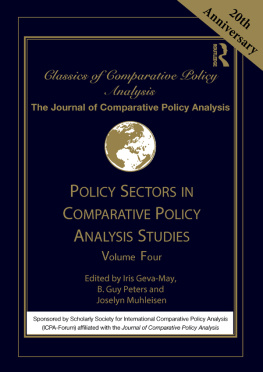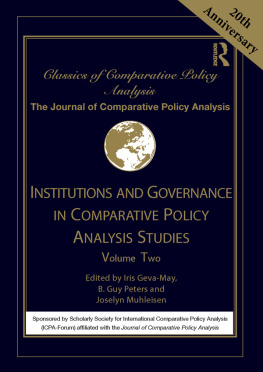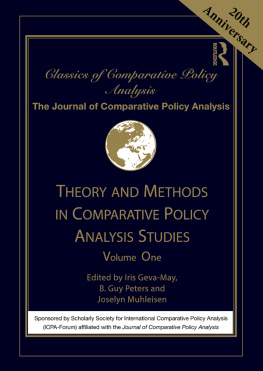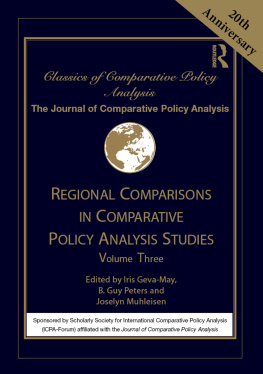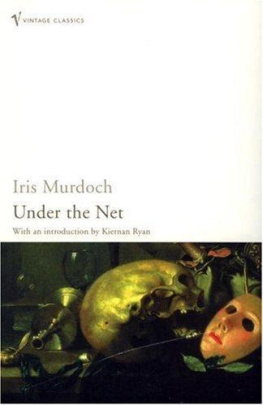First published in 1966 by George Allen & Unwin Ltd.
This edition first published in 2022
by Routledge
2 Park Square, Milton Park, Abingdon, Oxon OX14 4RN
and by Routledge
605 Third Avenue, New York, NY 10158
Routledge is an imprint of the Taylor & Francis Group, an informa business
1966 George Allen & Unwin Ltd.
All rights reserved. No part of this book may be reprinted or reproduced or utilised in any form or by any electronic, mechanical, or other means, now known or hereafter invented, including photocopying and recording, or in any information storage or retrieval system, without permission in writing from the publishers.
Trademark notice: Product or corporate names may be trademarks or registered trademarks, and are used only for identification and explanation without intent to infringe.
British Library Cataloguing in Publication Data
A catalogue record for this book is available from the British Library
ISBN: 978-1-03-203381-5 (Set)
ISBN: 978-1-00-321681-0 (Set) (ebk)
ISBN: 978-1-03-204965-6 (Volume 18) (hbk)
ISBN: 978-1-03-204970-0 (Volume 18) (pbk)
ISBN: 978-1-00-319539-9 (Volume 18) (ebk)
DOI: 10.4324/9781003195399
Publishers Note
The publisher has gone to great lengths to ensure the quality of this reprint but points out that some imperfections in the original copies may be apparent.
Disclaimer
The publisher has made every effort to trace copyright holders and would welcome correspondence from those they have been unable to trace.
FIRST PUBLISHED IN 1966
This book is copyright under the Berne Convention. Apart from any fair dealing for the purpose of private study, research, criticism or review, as permitted under the Copyright Act, 1956, no portion may be reproduced by any process without written permission. Enquiries should be addressed to the Publishers.
George Allen & Unwin Ltd., 1966
PRINTED IN GREAT BRITAIN
in 12 point Fournier type
BY C. TINLING AND CO. LTD
LIVERPOOL, LONDON AND PRESCOT
FOREWORD
To adopt is to take (a person) into a relationship he did not previously occupy. The picture of the homeless child adopted into the warmth and security of family life awakens a sympathetic response in each of us. Yet if the ideals called forth are to be realized we need to know a great deal about how and when to arrange adoptions and the best methods for selection and matching of child with adoptive parents. How much help if any should be available after the adoption is complete, is one of the most significant questions raised in Mrs Goodacres book.
Further knowledge is also necessary about the subsequent history of the adopted child. This is largely an uncharted sea because once the adoption order is made there is no statutory provision for supervision or special help and it has been policy to treat the fact of adoption as confidential. It may be only by chance or in special circumstances, as when a child attends a child guidance clinic or appears before a juvenile court that his adoption is revealed. These stray revelations connected with maladjustment or delinquency give a distorted picture and we clearly need a view of an unselected series of adoptions, not merely of those which present a problem at some stage. Anxiety about interference in family life or breaking confidence have for long hindered social workers from making systematic enquiries but the necessity for such a study in order to improve adoption practice has become increasingly apparent. Not only Mrs Goodacres success in winning co-operation from so large a proportion of the adopters approached but the wish expressed by many of them for further contact suggest that false fears had been built up and that adopters themselves welcome such an enquiry made with adequate safeguards and by the right person.
Here is an attempt to make a contribution to this necessary knowledge and this is believed to be the first book written by a social worker in this country who made a systematic study of certain stages of the adoption process and visited a random series of adoptive families (taken from the total list of adoption orders made in the selected area during a fixed period). A casework study was just the approach which the National Association for Mental Health had felt necessary and had advanced as long ago as 1954 when it published a Survey of Adoption Records.
A research study requires the right person to carry it out as well as the funds to support the work and both were forthcoming in 1960 when the Buttle Trust which, among its other interests, is concerned with the welfare of adopted children, gave a grant to the National Association for Mental Health to cover the three years study by Mrs Iris Goodacre. This generous action and the dauntless enthusiasm and skills of the research worker have produced this notable work.
Membership of the steering committee listed below indicates the professional interest aroused. It was believed that such a study would not only help social workers, and those directly concerned with adoption including adoption society and childrens committee members as well as magistrates but it would also supply valuable material for teaching purposes. Adoption, since it highlights family relationship, is a useful field for all social workers to study. There are few casework records and little casework material available for the student or teacher, and many of our theories depend on untested assumptions about the ways in which people act and think and are not based on facts and personal interviews.
It is here that Mrs Goodacre makes her special contribution. In her talks with the adoptive parents and with the child care officers or adoption society staff her social work training and experience gave her a background of knowledge and made her sensitive to the implications of what went on in the interview. The disciplines of social work guide the selection of significant points from a bewildering mass of information and define the objectives of the visit.
A full case record of any one such interview with an adoptive parent might swamp the reader with fascinating irrelevances. Human nature and its expression in relationships (and here the special relationship of adoption is under scrutiny) has infinite possibilities and infinite attraction. If to avoid this dissipation of interest we attempt to use only selected points from case records, this again is a two-edged weapon as we are in danger of losing the dynamics of the situation, needing to know more in order to understand. This is the problem which faces all writers using case records.
Here it has been tackled by weaving actual comments made by adoptive parents and the social workers associated with them into the discussion of a particular attitude. It may seem like repetition to give the adopters views of supervisory visits and then the social workers own comments on her supervision but the discerning reader will see that the careful reviewing from different angles enables the whole to be seen in the round. The use of live material makes it more vivid yet its restriction to apt quotation avoids the pitfalls of producing a human story which in its own right carries us away from the main argument.





